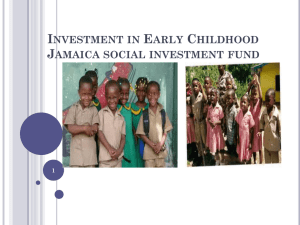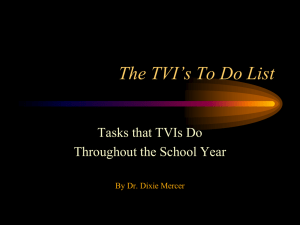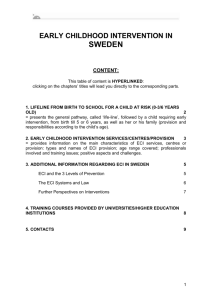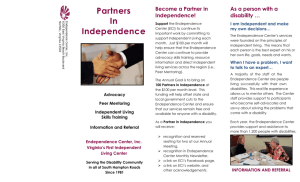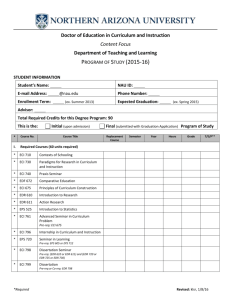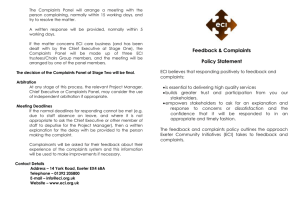early childhood intervention in portugal
advertisement
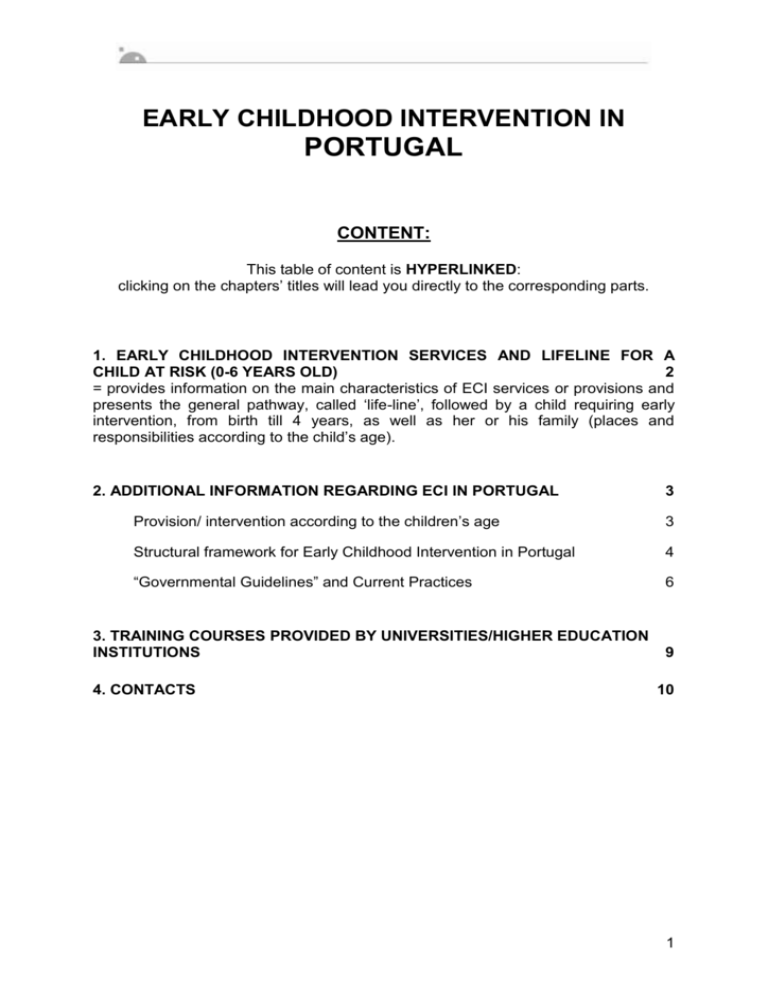
EARLY CHILDHOOD INTERVENTION IN PORTUGAL CONTENT: This table of content is HYPERLINKED: clicking on the chapters’ titles will lead you directly to the corresponding parts. 1. EARLY CHILDHOOD INTERVENTION SERVICES AND LIFELINE FOR A CHILD AT RISK (0-6 YEARS OLD) 2 = provides information on the main characteristics of ECI services or provisions and presents the general pathway, called ‘life-line’, followed by a child requiring early intervention, from birth till 4 years, as well as her or his family (places and responsibilities according to the child’s age). 2. ADDITIONAL INFORMATION REGARDING ECI IN PORTUGAL 3 Provision/ intervention according to the children’s age 3 Structural framework for Early Childhood Intervention in Portugal 4 “Governmental Guidelines” and Current Practices 6 3. TRAINING COURSES PROVIDED BY UNIVERSITIES/HIGHER EDUCATION INSTITUTIONS 4. CONTACTS 9 10 1 1. EARLY CHILDHOOD INTERVENTION SERVICES AND LIFELINE FOR A CHILD AT RISK (0-6 years old) Responsible Services Health Age Range of children 0-2 years 3-6 years Local Health Centre’s Medical Support (Family Doctor, Paediatrician) Council/ District Hospitals: development consultations, specialised consultations, some therapies (Speech Therapists, Occupational Therapists, physiotherapists) Mental Health Teams (in some hospitals) School Health (Health Centres) ECI Projects (Health Centres) ; ECI Direct Teams (Disp. 891/99) Education - Medical doctors - Nurses - Therapists - Psychologists (few) - Psychiatrists - Social workers Medical doctors; Nurses Inter-services / Inter-disciplinary Pre-school Educational Support Services (mainstream), home/nursery /pre-school support Psychology and Guidance Services Special Support Units for the deaf Pre-school teachers Specialised (and nonspecialised) preschool teachers Psychologists, teachers Resource Centre for Multi-handicapped Support Educators Occupational therapists Psychologists (partnership with an NGO) Social Security Staff involved ECI Projects (Private Special Education Institutions – Portaria nº1102/97) ; ECI Direct Teams (Disp. 891/99) Nursery/Child Care/ Child caretakers Local services for Social Support ; Social Intervention projects Private Special Education Institutions – NGOs (financing and supervision) Public Special Education Institutions (some therapies and support) Child Protection Centres (child abused/ neglected) Adoption Teams Financial allowances for disability (including services provided Sign language translators, Speech therapists, Support Educators Inter-services / /Interdisciplinary Child caretakers Social workers - Specialised (and nonspecialised) teachers - Therapists - Psychologists - Social workers for Private Special Schools) Others ECI Projects (Private Special Education Institutions) ECI Direct Teams (Disp. 891/99) Council Child Protection Commission (Inter-services + County Council + Private Institutions etc.) Inter-services / Inter-disciplinary Inter-services / Inter-disciplinary Private medical/psychological/specialised teaching or therapeutic services (paid by family, sometimes with financial help from Social Security or Health) 2 2. ADDITIONAL INFORMATION REGARDING ECI IN PORTUGAL A) Provision/ intervention according to the children’s age ● Service provision for children 0-6 years old Typology of Services Comments Special Education Centres (non-specific disabilities) Special Education Centres (by disability) Intervention non-specific to early childhood (all ages) Multidisciplinary teams Child-centred model / deficit oriented Centralised / non-proximity - Geographic asymmetry (urban centres / sea coasts) - Reasonably equipped - Very low coverage Specialised medical consultations Rehabilitation Mono-disciplinary / diagnosis focused Centralised/ non-proximity Mono-disciplinary / interdisciplinary Support Educators Proximity / Local Provision Itinerant (home or normal contexts) (funded by Social Security or Education) Itinerant Home / normal contexts, inter-services collaboration (informal) (funded by Social Security) District Hospitals Educational Support Teams / Services ECI projects Other projects (“Being a Child”, “Fight Against Poverty”... Direct ECI teams (Disp. 891/99) Private Offices Private ECI Centres Inter-services local provision and coordination Interdisciplinary State and Private Sp. Education Centres Agreement Medical or psychological or specialised teaching or therapeutic services ● Educational Support Teams - Service provision for children 0-6 years old Children Supported according aged and school level (2003) : Compulsory School 60% 50% 50% 40% 35% 30% 20% 10% 10% 3% 2% 0% 0-2 Years 3-6 Years 6-10 Years 11-16 Years + 16 Years 3 We observe the following trend for children from 0-6 years old supported by Education Support Services: Lower attendance of children from 0-2 Years (20%) compared with children from 3-6 years old (80%) 20% are children at risk (environmental or biological risk) B) Structural framework for Early Childhood Intervention in Portugal Previous Conditions Governmental Resolution – Guidelines for ECI (1999) Current Practices ● Previous Conditions - Inexistence of a governmental policy for E.I. till 1999 - The first Early Intervention Programs emerged as a bottom-up process on the decade 80-90. - At this time ECI Projects resulted from local level professionals’ “movements” as they were recognising existing local needs: Need to intervene earlier (before school-age) Need to a new intervention model and “new” skills Need to use in the best way the few local resources Need of an interdisciplinary work Need of a collaboration among different sectors ● Governmental Resolution for ECI (Joining Dispatch n. 891/99) - A Governmental Administrative Decision from Ministries of Education, Health and Welfare/Social Security; - Adopted: “Guidelines regulating early intervention for children with disabilities or at risk for severe developmental delay and their families”. - Defined: - Inter-sectors responsibility: Education, Health and Welfare/ Social Security - Public/private partnership (special education private/non-profit institutions) ● Governmental Guidelines for ECI (Joining Dispatch n. 891/99) - Definition: “Early Childhood Intervention is an integrated service (support) provision, child-centred and family-centred, which must include preventive and habilitative interventions, namely, in what concerns education, health and social ones”. - Goals: - To facilitate child development - To facilitate family-child interactions - To enhance family skills 4 - Target-Population: - Children 0-6 Years old, “preferably from 0-3 Years” - Children with disabilities or at risk of severe developmental delay (biological or environmental factors) - Eligibility: specific criteria and procedures are not mentioned - Features and Focus of Intervention : Intersectors Responsibility (no leader-agency) Health/ Education/ Social Security Local services collaboration (public private) Resources already available Interdisciplinary approach Teamwork Case Coordinator “IIndividualised Intervention Plan” Family Involvement (active participation and decision role) Home and natural environments Features and Focus of Intervention (Disp. 891/99): Family involvement (active participation and decision) Comprehensive and interdisciplinary approach Intersectorial responsibility – funding and human resources allocation Teamwork and Case Coordinator “Individualized Intervention Plan”(including transitions) Home and Natural Contexts Collaboration of local services and optimization of resources already available (formal and informal supports) ● ECI Services Organisation a) Direct intervention Teams - Local-level (county) - Education, Health and Welfare Public Services and Special Education Private /non-profits making institutions’ agreements in order to allocate human and financial resources b) Coordination Teams - District-level - Composed by the Representative professionals from each agency (4 elements) c) National Interdepartmental Group Composed by the Representative professionals from each above stateagency and a Representative from National Secretariat for Rehabilitation and Integration of People with Disabilities (4 elements) 5 National Interdepartmental Group Regional Structures ECI Coordination Team District Level ECI Direct Teams County Level Ensuring Guidelines application; Improving Regional action; Monitoring and Evaluation; Promoting research and studies Monitoring; Evaluation. Evaluation; Supervision; Eligibility; Training Services providers IFSP Case Management ● ECI Direct Teams (county level) Health Professionals funding or allocation Medical Doctors Nurses Therapists Social Security Professional funding Social worker Education Professional allocation Pre-school support teachers, Psychologists ECI Direct Team Private Special Education Centre State agreement C) “Governmental Guidelines” and Current Practices The implementation of Governmental “Guidelines” (D. 891/99) was initiated during 2000 and its development is in progress; a) Before Guidelines approval, there was already many ECI projects resulting from local initiatives and some of these projects assumed an ”inter-services” colaboration (formal or informally); b) Implementation of formal “interservices” organization is not generalised all over the country: c) 2 regions (Center and Alentejo) have implemented it and in some locals with some good practices; 6 d) This formal organization is not completely set in the other part of the country; e) Some difficulties related with the new funding system (shared-agreement between three sectors with local private institutions); f) Some “Early Intervention Projects” (initiated before 2000 with other financial supports) are in course, without following the Guidelines organization and philosophy; g) The National Interdepartmental Group had no activity since last 3 years– monitoring and evaluation is failing; h) Irregular awareness and insufficient commitment of sector agencies (national, regional and local levels). ● What we Know about ECI Practices in Portugal There is no comprehensive evaluation available about the implementation and impact of guidelines. Although we can take in consideration some issues based on different evaluation studies: - Partial evaluations developed by some projects itself, - Evaluation of Projects made for academically purposes - Sector evaluations and statistical data (administration and financial purposes), annual progress reports; - An important national survey was carried out by Ministry of Education (in collaboration) regarding: Services provided by educational support teams for children from 0-6 years old, and preschool teachers’ early intervention practices (ME, Educational Support Survey, 2000). - The results of the “European Parental Satisfaction Scale about E.I.” – EURLYAID. (“Evaluation of Satisfaction of Families supported by PIIP”, 2003). ● Positive Contributions of the Government Guidelines - Created a state commitment on Early Childhood Intervention - Defined an Early Childhood Intervention Framework: a philosophical model; crucial issues for practice - Established an organisational system (“interservices”) based on collaboration and a rationalisation of available resources - Encouraged the development of new projects and the adaptation of some others, in different points of the country - Increased the number of children and families supported - Family oriented practices have been increased - Ongoing progress is being developed regarding training in E.I. (academic level and in-service training) ● Some issues about Educational Support Services and the role of Support Educators a) Support Educators have a “pivot” role as a “primary interventionist” in direct intervention with children and families b) Usually, they are the “case coordinator” 7 c) They are the professionals who are locally present in all different ways of early intervention provision. d) From 2000 to 2003 the support provided to children from 0-6 years increased in 24% ● Challenged issues about ECI in Portugal To improve, changes are necessary on: a) The low Coverage, mainly from 0-2 years b) The delay in detection and referral c) The insufficient interdisciplinary practices d) The insufficient Family-centered practices e) The insufficient professional skills f) The irregular and insufficient awareness about the value of early intervention: goals and practices To enhance changing facilitators, we need: a) Consistent monitoring and evaluation: organizational and funding issues; intervention practices (processes) and child and family effects; b) Research c) Legal decisions and related policies more convergent d) Systematic and skilful Team Supervision e) Relevant training with quality standards f) An “infrastructure” assuring a national-level and effective coordination g) A lead-agency assuring local coordination h) Consistent and founded feedbacks to policymakers and practitioners 8 3. TRAINING COURSES PROVIDED BY UNIVERSITIES/HIGHER EDUCATION INSTITUTIONS In Portugal, training on early childhood intervention can take place as in-service training, in the form of special training courses provided by recognised professionals’ organisations. The subject of ECI can also be part of a Masters’ Degree on Special Education, organised in Lisboa, Aveiro and Coimbra Universities. In Portugal, Porto and Minho Universities offer a two-years Masters’ Degree focusing only on ECI, with a thesis required at the end. The general aim is to prepare professionals for work with families and to use specific tools, such as Portage, elaboration of a Family Support Plan, etc. This training is not free of charge. A transatlantic consortium in ECI is being developed by five universities in Europe Mälardalen University (Västerås, Sweden), Stockholm University (Sweden), Jyväskylä University (Finland), Ludwig Maximilians University (Munich, Germany), University of Porto (Portugal) – and three from the US. It provides students with a Masters’ degree or a Doctorate diploma. The ecologic and systemic approaches are at the basis of this co-operative training. Links: University of Porto http://www.up.pt/estudarup/grcurpr/gcprogr.htm University of Lisboa http://posgraduacoes.ulusofona.pt 9 4. CONTACTS Portuguese Early Childhood Intervention experts involved in the project: Name: Institution: Address: Ms. Isabel FELGUEIRAS Secretariado Nacional de Reabilitação Integração das Pessoas com Deficiência (SNRIPD) Av. Conde Valbom, n°63 1069-178 Fax: Email: Name: Institution: Address: Fax: Email: P- Lisbon Portugal +351 21 796 51 82 maria.i.felgueiras@seg-social.pt Ms. Graça BREIA Direcção de Serviços da Educação Especial e de Apoio Sócio-Educativo (DSEEASE) Travessa das Terras de Sant’Ana, nº 15, 1250-269, P – Lisbon Portugal +351 21 389 52 88 graca.breia@dgidc.min-edu.pt For contact details of the Portuguese representatives of the European Agency for Development in Special Needs Education, go to: www.european-agency.org (National Pages) 10
